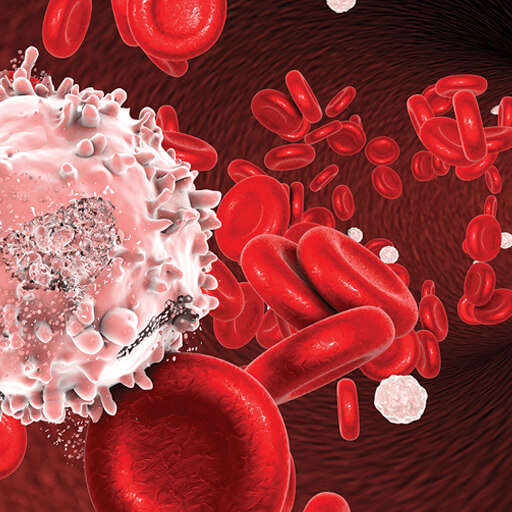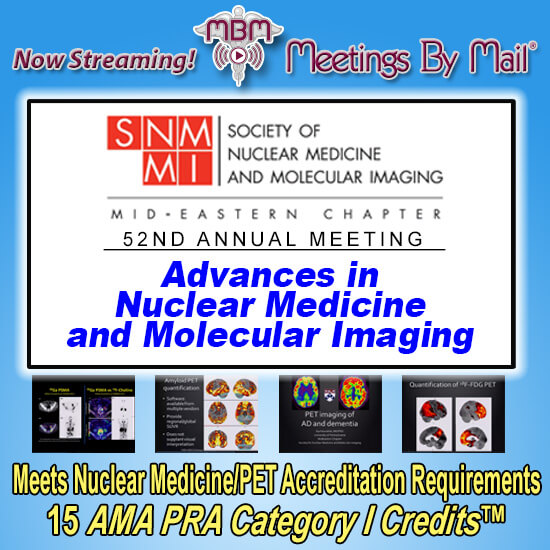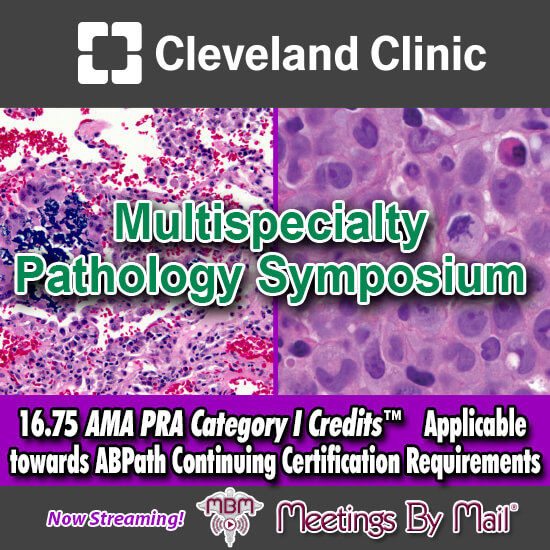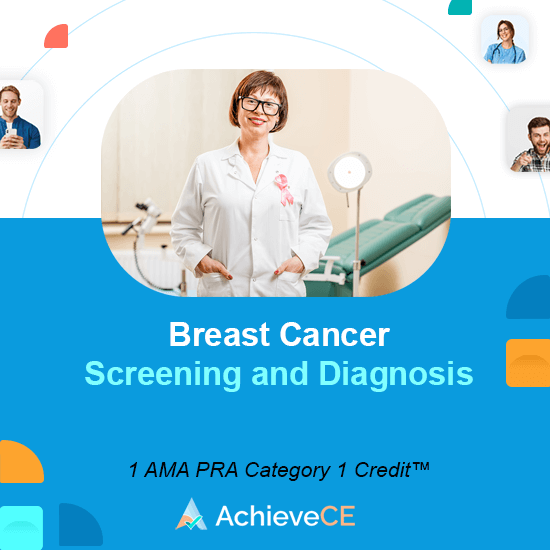Oncology CME
16 - 30 of 38 results
-
30% OFF W/ CODE: CME30
Oakstone CME The Brigham and Dana-Farber Board Review and Comprehensive Update in Hematology and Oncology
Essential Hematology and Oncology CMEThe Brigham and Dana-Farber Board Review and Comprehensive Update in Hematology and Oncology is a case-based online video CME program focused on improving overall knowledge and clinical competency with comprehensive updates on basic principles, changing guidelines, and therapeutic strategies. Continuing medical education areas for practice improvement include:
- Hematopoiesis and Cytokines
- Platelet Disorders
- Molecular Basis of Cancer
- New Therapies (Pharmacology)
- Palliative Care (Management of Symptoms/End of Life)
- Gastrointestinal Cancers (Neuroendocrine/Esophageal/Pancreas/Colorectal)
- Thoracic Oncology (Head/Neck/Lung/Thyroid)
- and many more…
- Cost: $1795
- Credit hours: 39
- CME credits awarded by: Oakstone Publishing
- Format: Online, On Demand, USB
- Material last updated: March 15, 2025
- Expiration of CME credit: March 14, 2028
-
Advances in Nuclear Medicine and Molecular Imaging
Advances in Nuclear Medicine and Molecular Imaging features fourteen internationally renowned faculty experts discussing nuclear medicine’s latest trends and emerging procedures. Created from the Mid-Eastern Chapter of the Society of Nuclear Medicine and Molecular Imaging’s 52nd Annual Conference, this activity presents the impact of radiopharmaceuticals on imaging, cardiology, oncology and much more. Robust discussions of imaging tools, administration equipment, dosimetry and future applications are included, as well. Worth 15 AMA PRA Category I Credits™, Advances in Nuclear Medicine and Molecular Imaging meets Nuclear Medicine/PET accreditation requirements and provides an essential update for all physicians and technologists involved with this area of medicine.
See full details chevron_right- Cost: $595
- Credit hours: 15
- Material last updated: October 4, 2024
- Expiration of CME credit: October 3, 2027
-
Cleveland Clinic Multispecialty Pathology Symposium
The Cleveland Clinic Multispecialty Pathology Symposium features an expert faculty addressing commonly encountered problems and providing practical tips from their own experience at the microscope. A broad spectrum of cases will be presented, reviewing genitourinary, pulmonary, gastrointestinal and soft tissue, gynecologic, and breast pathology. Participation in this activity will increase knowledge and improve performance in pathology, which will positively impact patient care.
Worth 16.75 AMA PRA Category I Credits™, all applicable towards the Lifelong Learning requirements in the American Board of Pathology (ABPath) Continuing Certification program. NO POST TEST required.
See full details chevron_right- Cost: $495
- Credit hours: 16.75
- Format: On-Demand Online
- Material last updated: 4/1/24
- Expiration of CME credit: 3/31/26
-
AchieveCE Breast Cancer Screening & Diagnosis
This video activity focuses on ways to help early detection of breast cancer by learning the risk factors, the different screening and diagnostic modalities and guidelines to what kind of screening is needed, and most importantly, when should screening begin.
See full details chevron_right- Cost: $11
- Credit hours: 1
- Expiration of CME credit: 10/17/2025
-
FREE
ScientiaCME Initial- and later-line treatment considerations in advanced renal cell carcinoma (RCC)
- Cost: Free
- Credit hours: 1
- Format: On-Demand Online
- Material last updated: 05/21/2024
- Expiration of CME credit: 05/21/2025
-
FREE
ScientiaCME Taking the next step in the management of relapsed or refractory follicular lymphoma
- Cost: Free
- Credit hours: 1
- Format: On-Demand Online
- Material last updated: 06/28/2024
- Expiration of CME credit: 06/28/2025
-
FREE
ScientiaCME Metastatic urothelial carcinoma (mUC): Updates from the 2024 American Society of Clinical Oncology (ASCO) Annual Meeting
- Cost: Free
- Credit hours: .75
- Format: On-Demand Online
- Material last updated: 08/24/2024
- Expiration of CME credit: 08/24/2025
-
FREE
ScientiaCME Pancreatic Cancer: Updates from the 2024 American Society of Clinical Oncology (ASCO) Annual Meeting
Over 64,000 people develop and close 50,000 die each year of pancreatic cancer, and by 2030, pancreatic cancer is expected to surpass colorectal and breast cancer to become the second-leading cause of cancer death. Over 90% of whom have pancreatic ductal adenocarcinoma (PDAC), and while the 5-year survival rate for patients diagnosed with localized disease is over 44%, patients with locally advanced (LAPC) or metastatic disease have a median overall survival of 12 to 14 months. Symptoms associated with pancreatic cancer are not usually evident in the early stages of the disease and may be intermittent and nonspecific, and more than half of patients have advanced disease by the time they are diagnosed.
See full details chevron_right- Cost: Free
- Credit hours: .75
- Format: On-Demand Online
- Material last updated: 09/21/2024
- Expiration of CME credit: 09/21/2025
-
USE CODE CMELIST10 FOR 10% OFF THIS CME
A Nationally Approved CME/CE Medical Marijuana Course – TheAnswerPage
The course introduces the reader to the endocannabinoid system and its interaction with the components of the cannabis plant, and addresses various aspects of medical marijuana, including administration, therapeutic use, drug metabolism, physiologic and cognitive effects, potential risks, and drug interactions.
The use of marijuana in obstetric patients, pediatric patients, adolescent patients and elderly patients is discussed in detail. Important considerations for patients with ischemic heart disease, hepatic disease, psychotic illness, and those with a history of drug dependence are also provided.
See full details chevron_right- Cost: $120
- Credit hours: 3
- CME credits awarded by: ACCME – AMA PRA Category 1 Credits™, ACPE, AANP, ANCC, APA, AGD PACE
- Format: On-Demand Online
- Material last updated: 05/21/2024
- Expiration of CME credit: 5/21/25
-
USE CODE CMELIST10 FOR 10% OFF THIS CME
CBD in Clinical Care – TheAnswerPage
CBD in Clinical Care provides information that will assist clinicians in effectively treating and counseling cannabidiol (CBD) consumers. The physiological effects of CBD, CBD drug interactions, CBD’s side effects, and the conditions for which CBD has been shown by evidence-based clinical studies to be efficacious are all discussed in this course.
See full details chevron_right- Cost: $80
- Credit hours: 2
- CME credits awarded by: ACCME – AMA PRA Category 1 Credits™, ACPE, AANP, ANCC, APA, AGD PACE
- Format: On-Demand Online
- Material last updated: 05/21/2024
- Expiration of CME credit: 05/21/2025
-
USE CODE CMELIST10 FOR 10% OFF THIS CME
New York Medical Cannabis Program Required Course Bundle – TheAnswerPage
The New York Medical Cannabis Program Required Course Bundle has been approved by the New York State Office of Cannabis Management and satisfies the New York educational requirements to become a practitioner with the New York Medical Cannabis Program.
This bundle introduces the reader to the endocannabinoid system and its interaction with the components of the cannabis plant, and addresses various aspects of medical marijuana, including administration, therapeutic use, drug metabolism, physiologic and cognitive effects, potential risks, and drug interactions.
The use of marijuana in obstetric patients, pediatric patients, adolescent patients and elderly patients is discussed in detail. Important considerations for patients with ischemic heart disease, hepatic disease, psychotic illness, and those with a history of drug dependence are provided.
The New York State Medical Cannabis Program Rules and Regulations are outlined in a state-specific course, as well.
See full details chevron_right- Cost: $165
- Credit hours: 3
- CME credits awarded by: ACCME – AMA PRA Category 1 Credits™, ACPE, AANP, ANCC, APA, AGD PACE
- Format: On-Demand Online
- Material last updated: 05/21/2024
- Expiration of CME credit: 05/21/2025
-
USE CODE CMELIST10 FOR 10% OFF THIS CME
Ohio Healthcare Provider Medical Marijuana Course Bundle for Certification (or maintenance of the CTR) – TheAnswerPage
The Ohio Healthcare Provider Medical Marijuana Course Bundle for Certification (or maintenance of the CTR) is certified by the Ohio State Medical Association and satisfies the CME requirements for the initial Ohio Certificate to Recommend (CTR) application or for maintenance of the CTR.
This bundle introduces the reader to the endocannabinoid system and its interaction with the components of the cannabis plant, and addresses various aspects of medical marijuana, including administration, therapeutic use, drug metabolism, physiologic and cognitive effects, potential risks, and drug interactions.
The use of marijuana in obstetric patients, pediatric patients, adolescent patients and elderly patients is discussed in detail. Important considerations for patients with ischemic heart disease, hepatic disease, psychotic illness, and those with a history of drug dependence are provided.
The Ohio Medical Marijuana Control Program rules and regulations are outlined in a state-specific course, as well.
See full details chevron_right- Cost: $165
- Credit hours: 3
- CME credits awarded by: ACCME – AMA PRA Category 1 Credits™, ACPE, AANP, ANCC, APA, AGD PACE
- Format: On-Demand Online
- Material last updated: 05/21/2024
- Expiration of CME credit: 05/21/2025
-
USE CODE CMELIST10 FOR 10% OFF THIS CME
Pennsylvania Medical Marijuana Program Required Course Bundle – TheAnswerPage
The Pennsylvania Medical Marijuana Program Required Course Bundle has been approved by the Pennsylvania Department of Health and satisfies the Pennsylvania educational requirements to become a practitioner with the Pennsylvania Medical Marijuana Program.
This bundle introduces the reader to the endocannabinoid system and its interaction with the components of the cannabis plant, and addresses various aspects of medical marijuana, including administration, therapeutic use, drug metabolism, physiologic and cognitive effects, potential risks, and drug interactions.
The use of marijuana in obstetric patients, pediatric patients, adolescent patients and elderly patients is discussed in detail. Important considerations for patients with ischemic heart disease, hepatic disease, psychotic illness, and those with a history of drug dependence are provided.
This course bundle also addresses the use of cannabidiol (CBD) in clinical care, and the information will assist clinicians in effectively treating and counseling CBD consumers. The physiological effects of CBD, CBD drug interactions, CBD’s side effects, and the conditions for which CBD has been shown by evidence-based clinical studies to be efficacious are all discussed in this course bundle.
The Pennsylvania Medical Marijuana Program rules and regulations are outlined in a state-specific course, as well.
See full details chevron_right- Cost: $189
- Credit hours: 5
- CME credits awarded by: ACCME – AMA PRA Category 1 Credits™, ACPE, AANP, ANCC, APA, AGD PACE
- Format: On-Demand Online
- Material last updated: 5/21/24
- Expiration of CME credit: 5/21/25
-
USE CODE CMELIST10 FOR 10% OFF THIS CME
Utah Medical Cannabis Program Required Course Bundle – TheAnswerPage
The Utah Medical Cannabis Program Required Course Bundle has been approved by the Utah Department of Health and satisfies the Utah educational requirements to become a practitioner with the Utah Medical Cannabis Program.
The Utah Medical Cannabis Program Required Course Bundle introduces the reader to the endocannabinoid system and its interaction with the components of the cannabis plant, and addresses administration, therapeutic use, drug metabolism, physiologic and cognitive effects, potential risks, and drug interactions.
The use of marijuana in obstetric patients, pediatric patients, adolescent patients and elderly patients is discussed in detail. Important considerations for patients with ischemic heart disease, hepatic disease, psychotic illness, and those with a history of drug dependence are provided.
This course bundle also provides information that assists clinicians in effectively treating and counseling CBD consumers.
See full details chevron_right- Cost: $150
- Credit hours: 5
- CME credits awarded by: ACCME – AMA PRA Category 1 Credits™, ACPE, AANP, ANCC, APA, AGD PACE
- Format: On-Demand Online
- Material last updated: 05/21/2024
- Expiration of CME credit: 05/21/2025
-
USE CODE CMELIST10 FOR 10% OFF THIS CME
West Virginia Medical Cannabis Program Required Course Bundle – TheAnswerPage
The West Virginia Medical Cannabis Program Required Course Bundle has been approved by the West Virginia Department of Health and Human Resources, Bureau for Public Health, Office of Medical Cannabis and satisfies the West Virginia educational requirements to become a practitioner with the West Virginia Medical Cannabis Program.
This course introduces the reader to the endocannabinoid system and its interaction with the components of the cannabis plant, and addresses administration, therapeutic use, drug metabolism, physiologic and cognitive effects, potential risks, and drug interactions.
The use of marijuana in obstetric patients, pediatric patients, adolescent patients and elderly patients is discussed in detail. Important considerations for patients with ischemic heart disease, hepatic disease, psychotic illness, and those with a history of drug dependence are provided.
This course bundle also addresses the use of cannabidiol (CBD) in clinical care, and the information will assist clinicians in effectively treating and counseling CBD consumers. The physiological effects of CBD, CBD drug interactions, CBD’s side effects, and the conditions for which CBD has been shown by evidence-based clinical studies to be efficacious are all discussed in this course bundle.
The West Virginia medical cannabis program rules and regulations are outlined in a state-specific course, as well.
See full details chevron_right- Cost: $189
- Credit hours: 5
- CME credits awarded by: ACCME – AMA PRA Category 1 Credits™, ACPE, AANP, ANCC, APA, AGD PACE
- Format: On-Demand Online
- Expiration of CME credit: 5/21/25













